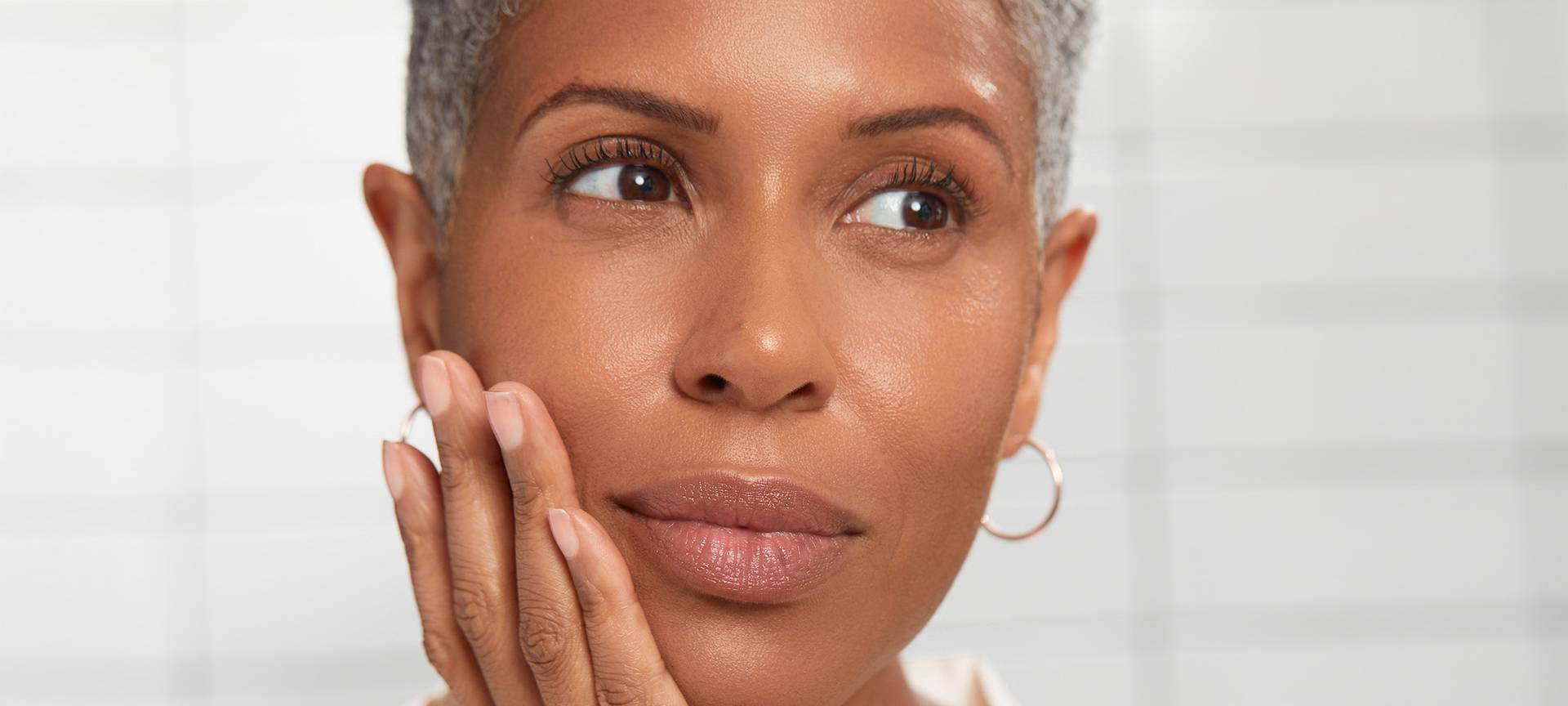
You might possibly have experienced a dehydrated skin at some point.
Imagine after convincing yourself for so many years and telling anyone who cares to listen that you have a dry skin only to discover today after reading this post that you’ve been wrong all this while.
Though the terms "dry" and "dehydrated" are often used interchangeably, just like “Sensitive” and “Sensitized” skin, they’re not the same.
While they both share lots of similarities and symptoms, here are some of the key differences you should know about the two and how best to manage it.
What Is Dehydrated Skin?

If you have a dehydrated skin condition, your skin is lacking water. This can happen to anyone, no matter your skin type and is a temporary condition that could be fixed.
Healthy skin contains around 30% water, which is essential for maintaining the skin’s structure, strength, and resiliency. When the skin loses too much water, it becomes dehydrated.
This excessive loss of water can be due to a damaged skin barrier, a lack of water in the diet, or extreme weather conditions (cold, arid climates) and lifestyle factors such as smoking, drinking too much alcohol.
But here’s where it gets tricky: When skin is dehydrated, it creates more oil to make up for the missing water which could trigger breakouts, irritation and dry patches.
Signs of a dehydrated face include:
- Skin feeling tight and uncomfortable - even after moisturizing
- Redness and inflammation
- Congestion
- An unusually oily, shiny complexion
- Fine lines and wrinkles are more pronounced
- Dark circles or tired eye appearance becomes prominent
- Skin becomes generally dull
- Lack of elasticity in skin
Best Ingredients For Dehydrated Skin:
Use Natural humectants because they allow the skin to improve its ability to hydrate itself over time, so look out for products that contain:
Hyaluronic acid, glycerin, aloe, honey, snail mucin, lactic acid, citric acid, ceramides.
What is Dry Skin?

Dry skin is a skin type (just like oily or sensitive or normal) it means you’re lacking oil. You were born this way, and you’re dry everywhere else on your body including hands, scalp, legs, etc. When you put on moisturizers and lotions, chances are they soak up fairly quickly. You may also regularly experience regular flaking, cracking, sensitivity or issues like eczema.
The real giveaway is skin's texture - Dry skin occurs deep between the layers of your skin but causes dry, flaky skin cells to appear on the surface, making skin appear rough, cracked and a little bit leathery "It lacks suppleness and elasticity, which leads to wrinkles and affects skin barrier.
Signs of dry skin include:
- Rough or itchy skin
- Flaky skin
- Redness and irritation
- Skin feels tight
- Small, fine wrinkles
- Thin, fragile skin
Those with dry skin types are also prone to inflammatory and excessively dry skin concerns like atopic dermatitis (eczema) characterized by redness, cracking and inflammation.
Dry skin is often due to genetics but can be worsened by internal and external factors. Extreme temperatures, both hot and cold, can exacerbate dryness. Similarly, harsh skincare products that strip the skin can remove too much oil, leading to dry skin. Other factors that may contribute to dryness include medical conditions, lifestyle, hormones, and the natural aging process.
Best Ingredients For Dry Skin:
Use emollient (soothing) or occlusive (waxy, air- and water-tight) ingredients such as:
Hyaluronic acid, ceramides, coconut oil, almond oil, hemp oil, shea butter, squalene, jojoba, rosehip, tea tree, lanolin, Vaseline (mineral oil).
Ingredients To Avoid If You Have Dry Or Dehydrated Skin
It’s also important to avoid products with strong ingredients that remove moisture and oil leaving skin dry, flaky and tight. For example;
- Benzoyl peroxide
- Salicylic acid
- Alcohol
- Witch hazel
- Avoid Sodium lauryl sulfate instead opt for Sodium Laureth Sulfate in your cleansers - much gentler and doesn't strip the epidermis of any excess moisture.
Before we talk about how to treat dryness and dehydration, Let's quickly brush through two important terms "Moisturizing and Hydrating" which are often used interchangeably and are key to understanding dry and dehydrated skin types much better.

Hydrating Vs Moisturizing: What's The Difference?
As You may now know, Water plays a central role in making sure your skin stays healthy, smooth and radiant, so it only makes sense that every skin care aisle is lined with products that promise to hydrate and moisturize skin. But what many of us may not realize is that although they are often used interchangeably, moisturizing and hydration are not exactly the same thing. While both are key in providing skin with much-needed nourishment, knowing the difference will help you make the best choice when targeting your skin’s specific needs.
What’s the Difference Between Hydrating and Moisturizing?
Moisturizers and hydrators both address the importance of making sure the skin is getting all the water it needs to fight dryness and dehydration, premature signs of aging and environmental damage. The difference, however, lies mostly in how they go about achieving these results
Hydration is all about increasing the water content of the skin that leads that makes it to swell and be plump and bouncy, and in the process reflects light well.
If the reverse happens and water flows out of the skin cells, the skin becomes dehydrated and shrunken, which leads to dull lackluster skin.
This means that when you’re using a topical hydrator, you’re infusing your cells with water and improving your skin’s ability to absorb moisture and nutrients.
On the other hand, moisturizing is about trapping and sealing in moisture to build the skin’s protective barrier, prevent water loss and keep the skin soft and smooth.
A moisturizer’s job is to reduce the amount of water that evaporates off of the skin to minimize trans-epidermal water loss. They lock in and seal in moisture which makes it a staple for dry skin.
How To Take Care of Dehydration & Dryness
Dryness and dehydration can both be managed with healthy skincare habits and similar skincare routine. Keep reading for 7 expert tips for combating dryness and dehydration for healthier, more radiant looking skin.
Tip #1: Nourish and Protect Your Skin Barrier
If the skin barrier is damaged, it’ll be less able to do its job properly. This can result in excessive water loss, leading to dehydrated skin, increased sensitivity, and frequent irritation. You can help protect your skin barrier with antioxidant-rich treatments designed to strengthen and nourish the skin, like Niacinamide Serum, Hyaluronic Acid serum and Hemp Oil Rescue Serum.
Neutriherbs Niacinamide serum is an effective formula that stars hyaluronic acid, one of the best ingredients that works for both dry and dehydrated skin.

This best-selling serum is clinically-demonstrated to double skin’s strength and improve the appearance of a range of concerns, including fine lines, dullness, and uneven skin texture.
Despite its potency, this serum is suitable for all skin types and gentle enough for daily use. We recommend applying it to the face and neck morning and night to promote a balanced, healthy radiant appearance.

On the other hand, The Hemp Oil Rescue Serum is made with Hemp seed oil and portula oleracea extract to calm irritation and ease the appearance of dry, tired, dehydrated skin. Just two drops twice a day after cleansing deliver much-needed hydration, lasting relief and strengthens skin barrier.
Prepare to be hydrated when using the Neutriherbs Hyaluronic Acid Serum. Packed with Niacinamide,this lightweight serum plumps and replenishes moisture like a charm and with the Vitamin C inside of it, this satisfyingly rich serum could be a serious game-changer for you.

It helps speed up collagen production, a few drops of the serum leave the skin looking plump and smooth immediately — while also working to stave off fine lines in the long run.
Tip #2: Don’t Skip Eye Cream
The skin around your eyes is thinner and drier than the rest of your facial skin. The lack of oil in this area makes under-eye skin uniquely susceptible to age-related concerns, like under-eye wrinkles, fine lines, and dark circles.
To keep under-eye dryness at bay, using a moisturizing eye cream is vital.
We recommend our iconic Pro Eye Gel, which is formulated with star ingredients like folic acid, Beta Glucan, Niacinamide, oligopeptides, collagen and hyaluronic acid.

The gel-like formula provides deep hydration to instantly improve the texture of under-eye skin. With regular use, it also helps minimize puffiness for brighter, smoother-looking eyes.
Tip #3: Choose Your Cleanser Carefully
If you’re prone to dry or dehydrated skin, using the right cleanser can make a huge difference in how your skin looks and feels. Cleansers with harsh ingredients, like strong acids or aggressive physical exfoliants, can damage the skin barrier, making you more prone to losing natural oils and water. Instead, reach for non-stripping formulas, like our iconic Vitamin E Gentle Cleanser.

This gentle mild foaming cleanser contains Jojoba Esters, Vitamin E and high quality avocado oils to remove dirt and excess oil without over-drying the skin. It’s pH-balanced and gentle enough for all skin types, even sensitive skin. Use it to cleanse your face morning and night and rinse with lukewarm (not hot!) water for clean, balanced skin.
Tip #4: Step Up Your Moisturizer Game
Some of the most prominent signs of dehydrated skin are also associated with premature aging. This is because dehydrated skin is less elastic and therefore less able to retain its shape after repeated movements, like squinting. A good moisturizer can help minimize the appearance of some of these concerns for a more healthy look.
Make sure you're finishing off your day and nighttime skin-care routines with a moisturizer rich in emollients, humectants like Hyaluronic Acid and most especially ceramides is the most obvious. If you’re not familiar with ceramides – They are lipids (aka fat molecules) that "help the skin retain moisture and allow for proper function such that when your skin lacks them, dryness and irritation occur. But a great moisturizer will replenish your skin's ceramide levels and hydrate it in the process.
Not just any moisturizers works. There are 3 moisturizers you could pick from:
Top on that list is Our Newest 4D Hyaluronic Acid Gel Moisturizer, which is formulated with a potent multi-blend of 4 types of hyaluronic acid each with different molecular weights, panthenol, and Niacinamide.

It actively targets the three layers of skin (the epidermis (top layer), dermis (the second layer), and the subcutaneous fat (bottom layer) building up and forming a three-dimensional network and accurately targeting the different layers of the skin to replenish water from outside and hold water from the inside, to provide deep, long lasting hydration and plumping. With this super moisturizer skin is moisturized and hydrated completely and improves in elasticity directly from within.
One of our best sellers and an excellent moisturiser for dry skin, Vitamin E Moisturizing Face Cream helps to address dryness, dehydration, ageing, fine lines and wrinkles on the face, neck, and decolletage.

Non-greasy, it contains a blend of rosehip, coconut, avocado, and jojoba oil plus the anti-ageing, antioxidant power of Vitamin B3.

Finally, Hemp Oil Rescue Cream - This breakthrough clinical recovery moisturizer for sensitive dry and dehydrated skin can help soothe your skin and return it to its naturally healthy and supple-looking nature. Ingredients like Calendula offinalis and Allantoin work together in this cream to help support a healthy skin barrier to protect sensitive skin from environmental irritants.
Tip #5: Exfoliate once a week
Exfoliating is also key for both dry and dehydrated skin, alike. Dead skin cells may be built up on the surface of your face, keeping it from properly absorbing products, particularly moisturizer. That’s why we recommend exfoliating at least once a week to help slough away that build-up and allow your skin-care routine to work more efficiently.
If your skin tends to be sensitive or dry or normal, reach for a chemical exfoliator formulated with alpha hydroxy acids (AHAs), like glycolic acid. They exfoliate the upper layers of the skin while also hydrating and helping your skin retain moisture
The Neutriherbs AHA serum with Glycolic acid, lactic acid, citric acid will do the trick.

Those with super oily skin, though, should go the slightly different exfoliating route to more effectively remove sebum buildup. We recommend looking for a formula with Salicylic Acid (a type of beta hydroxy acid, or BHA) on its ingredient list, which "gently speeds up skin turnover and better penetrates oil and oily follicles." Need some help picking the right one?

This Neutriherbs Salicylic Acid Exfoliating Serum should be a staple in your routine no matter what.
Tips #6: Consider slugging
In extreme case of dryness and dehydration you should strongly consider slugging. It involves coating your skin in a layer of Vaseline after moisturizing before going to sleep. You'll wake up with a more nourished complexion. Yup, that's right — Vaseline is actually good for your face. It helps your skin seal in all the moisture from the serum and creams you topped it with and lock in hydration.
Tip #7: Pay attention to the seasons
Temperature and humidity changes can affect the way your skin looks and behaves. Harmattan is particularly harsh as cold, low humidity air can cause skin to dry out and become itchy, cracked and irritated. Cold air also tightens pores, reduces circulation, and reduces sebum production to cause dry, flaky skin.
Low humidity, hot showers, and central heat also contribute to skin dehydration. Either way, a moisture-packed skin-care routine will save you from harmattan's wrath.
Fortunately, the atmosphere holds more water in the rainy seasons — like a natural humidifier — providing an extra boost of water to our skin. But too much direct sunlight can cause dehydration, so be extra vigilant with sunscreens.
For those travelling for holidays abroad kindly pay much attention to the seasons of your destination so you pick the right skincare for you.



Comment
Thank you very much for this tips it really helped me. I’m just pained I didn’t found out about the differences before getting a skincare products, but with these information I won’t make the same mistakes. Also I don’t know if I can subscribe to weekly newsletter if you have one. Thank you once again and congratulations on your anniversary.